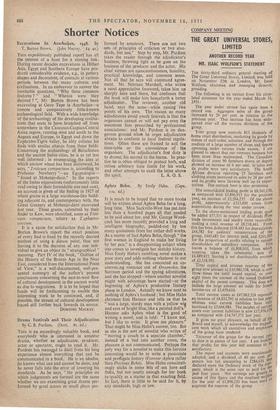Drama Festivals and Their Adjudication By C. B. Purdom. (Dent.
8s. 6d.) TiltS is an exceedingly valuable book, and everybody who is interested in amateur drama, whether as adjudicator, producer, actor or spectator, ought to read it. Mr. Purdom has managid to distil from his long experience almost everything that can be communicated in a book. He is an idealist,' he knows what can and cannot be done, and he never falls into the error of lowering his standards. As he says, "the principles on which judgements are formed are the same whether we are examining great drama per- formed by great actors or small plays per- formed by amateurs. There are not two sets of principles of criticism or two stan- dards, but one." Step by step, Mr. Purdom takes the reader through the adjudicator's business, throwing light as he goes on the business of the producer and the actor. His chief virtues are conscientiousness, humility, practical knowledge, and common sense. Not all that he says will command agree- ment. Mr. Norman Marshall, who writes a most appreciative foreword, takes him up sharply here and there, but confesses that the book will make him henceforth a better adjudicator. The reviewer, another old hand, says the same—while raising two points of his own. The /reason so many adjudicators avoid youth festivals is that the organisers cannot or will not pay even the minimum fees prescribed by professional associations: and Mr. Purdom is on dan- gerous ground .whett he urges adjudicators always to conform to local festival regula- tions. Often these are framed to suit the time-table or the convenience of the organisers. The adjudicator's first duty is to drama, his second to the teams. In prac- tice he is often obliged to protect both, and refuse arbitrary time limits for his work, and other attempts to exalt the letter above














































































 Previous page
Previous page